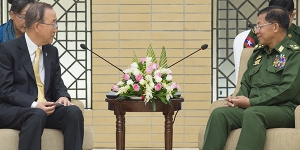Myanmar’s Difficult Path Toward Peace
International attention toward Myanmar has focused largely on the country's transition from a half-century of military rule toward democratic governance. But ending nearly 70 years of civil conflict among the country's ethnic nationalities remains essential to the country's stability and success. In its first eight months, the elected government of State Counsellor Aung San Suu Kyi has invited more of the country’s ethnic armed groups to join new peace talks. Still, fighting has continued and in some places worsened. On November 4, the U.S. Institute of Peace will gather specialists on the peace process to examine its current state and highlight ways that the international community can help.
Read the event coverage, Myanmar Peace Process: Slow Progress, Delicate Steps.
In October 2015, several of Myanmar’s ethnic armed organizations signed a Nationwide Ceasefire Agreement with the government of former President Thein Sein. Since taking office in March, Aung San Suu Kyi’s government has likewise made peace its priority. It convened its 21st Century Panglong Conference in August, bringing nearly all of the country’s ethnic armed groups into a nascent dialogue process. Since then, fighting in Shan, Kachin, and Karen states has expanded, and fresh clashes in Rakhine state continue to undermine trust and confidence in the process.





